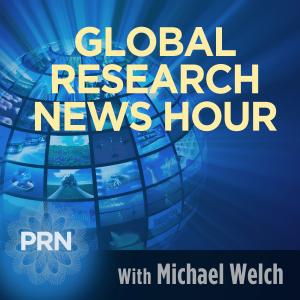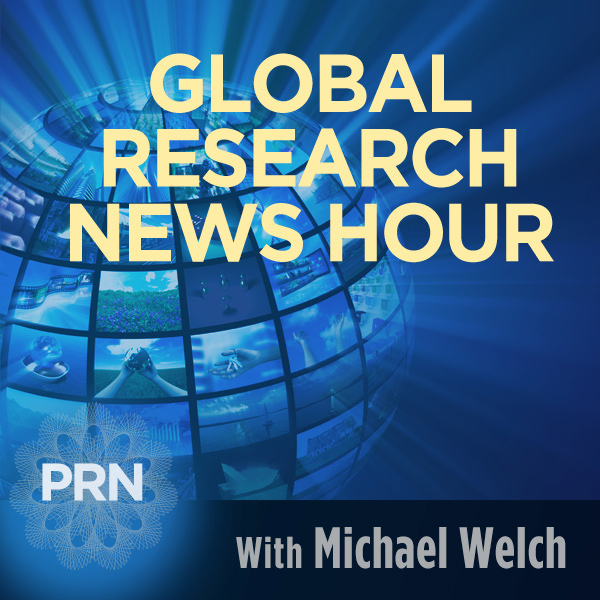Episodes

Tuesday Dec 31, 2013
Global Research News Hour - Chris Hedges - 12/30/13
Tuesday Dec 31, 2013
Tuesday Dec 31, 2013
On this, the holiday edition of the Global Research News Hour, we present a talk by Chris Hedges.

Monday Dec 23, 2013
Monday Dec 23, 2013
Webster’s dictionary defines the term ‘Trojan Horse’ as follows:
“…someone or something intended to defeat or subvert from within usually by deceptive means.”[3]
The term has been applied by critics to any number of so-called free trade deals that Canada, the United States and other countries around the world are embracing.
In Canada, the Harper government recently extolled the virtues of opening up new markets for Canadian goods, services and investment in the European Union and Asia as critical to the nation’s prosperity. Hence, determined efforts to secure free trade deals with these regions through the Canadian – European Union Comprehensive Economic and Trade Agreement (CETA) and the Trans-Pacific Partnership (TPP) respectively are hailed by the government and pundits alike as centrepieces of the Harper government’s agenda going into 2014.
Interesting that the details of these agreements are largely hidden from public scrutiny.
The TPP in particular, as noted by Global Research author Kevin Zeese, has been drafted with an unprecedented degree of secrecy.
The campaign ‘FLUSHTHETPP.org‘ claims that the gift horse that is increased trade and investment, conceals a corporate assault on food safety, the environment, worker rights, access to health care, and basically every facet of our lives as free citizens.
A recent release of the Intellectual Property Rights Chapter from Wikileaks confirmed the fears of trade liberalization critics that the reach of patents, copyrights, and trade secrets will be extended at the expense of consumer rights and safeguards.[4]
To quote Wikileaks editor in Chief Julian Assange:
“If instituted, the TPP’s IP regime would trample over individual rights and free expression, as well as ride roughshod over the intellectual and creative commons. If you read, write, publish, think, listen, dance, sing or invent; if you farm or consume food; if you’re ill now or might one day be ill, the TPP has you in its crosshairs.”[5]
The TPP secured third place among Project Censored’s most censored stories of 2012-2013. The Sonoma State University media research program describes the TPP as “an enforceable transfer of sovereignty from nations and their people to foreign corporations.”
Dr. Margaret Flowers is a congressional fellow with Physicians for a National Health Program and a pediatrician based in Baltimore, Maryland. She has written extensively on the topic of the TPP, and has championed efforts to stop it in its tracks. Dr. Flowers joins the Global Research News Hour in the fist half of the programme to describe the onerous aspects of this deal, update us on the recent twelve nation talks in Singapore, America’s ‘Fast-Track’ legislation, and the realistic prospects of grassroots people to bring an end to this deal.
CETA, likewise is cloaked in secrecy. Critics like Stuart Trew of the Council of Canadians argue the deal extends drug patents and makes community economic development initiatives such as ‘buy local’ policies subject to legal challenges under new procurement rules. Trew will fill out the second half of the programme with a comprehensive look at what we know about the CETA, and how that deal can be stopped.

Monday Nov 04, 2013
Monday Nov 04, 2013
The Shut-Down continued throughout the first two weeks of October, as Congress and the White House struggled to come up with the necessary legislative formula before October 17 when, we are told, a “debt default” would result should no deal be reached.
 A major sticking point was the refusal of the House of Representatives, controlled by the Republican Party, to approve of government funding up until the middle of December, unless President Obama’s Affordable Care Act, otherwise known as ObamaCare, was delayed a year and then gutted of a key provision, namely the tax on medical devices.
A major sticking point was the refusal of the House of Representatives, controlled by the Republican Party, to approve of government funding up until the middle of December, unless President Obama’s Affordable Care Act, otherwise known as ObamaCare, was delayed a year and then gutted of a key provision, namely the tax on medical devices.
The gridlock was finally broken when President Obama “stared down” the Republicans in the House leaving ObamaCare mostly intact. Appropriatations Bill HR 2775 was approved, bringing an end to the government shut down, maintaining government funding until January 15, and lifting the already stratospheric $16.699 trillion debt ceiling until February 7.
But as some observers, such as broadcast journalist and author Stephen Lendman points out, default or no, ordinary Americans have had to bear the burden of the real fiscal crisis which has been masked by this legislative game of chicken. Lendman also levels a critique of ObamaCare that you won’t hear from House Republicans, and he explains how the crisis engulfing the city of Detroit mirrors America’s future. Stephen Lendman presents his perspective in the first half hour of the Global Research News Hour.
In the second half hour, a York University Professor of Political Science, David McNally, helps expand the discussion by elaborating on the roots of the US fiscal crisis in neo-liberal reforms. He argues that the stand-off and the 2008 economic slump that preceded it, are rooted in the development of policies that have benefited the most privileged, including the banks, at the expense of the working class, who are now being made to pay for the excesses of the ultra-wealthy. McNally also probes the mistakes of the Occupy Movement as he sees it, and articulates how an effective push back may be realized.
David McNally provides his analysis in the final half hour.

Monday Oct 21, 2013
Global Research News Hour - 10/21/13
Monday Oct 21, 2013
Monday Oct 21, 2013
The company Monsanto is a multinational Chemical and Agricultural Biotechnology company based in Creve Coeur, Missouri.
It is most famous (or infamous) for its production of genetically engineered seeds as well as its production of the weed killer Roundup.
The company, which began as a small chemical start-up company in 1901, has grown to become an immensely powerful corporation with Net Sales for the 2012 fiscal year of over $13.5 billion and operations in 68 countries across six continents. [2] [3] [4]
According to a recent study by Food and Water Watch, 93% of the US soybean market, and 80% of the US corn market contain genetics patented by the agribusiness giant. [5]
Monsanto owns over 1,676 patents on seeds plants and other agricultural applications. [6]
Since 1996, the amount of acreage supporting Monsanto’s genetically engineered (GE) crops has exploded from 3 million to 282.3 million worldwide. In the US alone, 151.4 million acres of land support Monsanto’s GE products, accounting for 40% of overall acreage devoted to agricultural production across the board. [7]
Monsanto’s success is not solely, if at all, attributable to its ability to create a superior product. Monsanto has been very aggressive in its lobbying and public relations efforts. According to figures from the Center for Responsive Politics, Monsanto has donated over $4,607,790 to US political campaigns since 1990, and has spent over $61,852,724 since 1998 lobbying elected representatives. [8]
More insidious perhaps, is the revolving door which sees Monsanto board members having worked for the US Environmental Protection Agency and the US Department of Agriculture, not to mention positions in public universities, industry and trade groups. (See diagrams below.)

Tuesday Oct 15, 2013
Tuesday Oct 15, 2013
The United States and its coalition allies have perpetrated serious violations of international law including the breaching of the UN Charter and multiple violations of the Geneva Conventions, the US Army Field manual, and the Hague Conventions. [1]
Over 600,000 civilians are estimated to have died as a direct consequence of US President George W. Bush’s war against Iraq and its mythical ‘weapons of mass destruction.’ [2] Depleted Uranium munitions has caused birth defects on a massive scale, and will plague this ancient civilization for millennia to come.
Amply documented, torture was employed by US troops under the authorization of US Officials like Vice President Richard Cheney, who comes to Canada in late October.
This installment of the Global Research News Hour features a look at US and allied war crimes and more particularly, the need for accountability for those crimes.
Denis Halliday is the former UN Humanitarian Coordinator in Iraq ( September 1, 1997 until 1998.) He resigned from a 34 year career at the United nations in protest to what he saw as the ‘genocidal’ economic sanctions carried out against the Iraqi people through the UN Security Council. Halliday is intensely critical of the UN for aiding and abetting the US and UK in their criminal aggression of 2003 and beyond. He is also critical of the World Health Organization for likewise assisting the imperial Western Giants by suppressing its own report on the effects of the use by US forces of Depleted Uranium on the Iraqi civilian population. He outlines in this interview what he thinks the UN could have done, and still can do, to restore some credibility. Denis Halliday has been an occasional contributor to Global Research. This is his first interview for the Global Research News Hour.
Some soldiers such as Staff Sergeant Camilo Mejía and Joshua Key did their duty under international law and refused to return to service in the Iraq War.
Professor Francis Boyle is a professor of international law at the University of Illinois College of Law and an internationally recognized expert in his field. In 2007, Boyle publicly denounced what he called the “ongoing criminal activities perpetrated by the Bush Jr. administration and its nefarious foreign accomplices in allied governments such as in Britain, Australia, Japan, South Korea, Georgia, etc.” Boyle is the author of Protesting Power: War, Resistance, and Law. He will explain the legal obligations of countries like the US and Canada to respect the right of soldiers to refuse to participate in this war.
While the Canadian government is turning away Iraq War resisters, they are welcoming credibly accused Iraq war criminals into the country. Mere weeks before Vice- President Cheney is to give a speech in Toronto, we will hear from Gail Davidson of Lawyers Against The War about the legal obligation of the Canadian government to deny the former Vice President admittance into Canada or place him under arrest upon entry.
Be sure to check out the Global Research Iraq War Reader for more in depth coverage of US/NATO War Crimes in Iraq.

Monday Sep 30, 2013
Monday Sep 30, 2013
Most human beings by nature are anti-war.
All military conflicts involve death and destruction, to say nothing of unintended consequences.
This is why for generations, military planners have made use of war pretext incidents to galvanize war-averse populations behind aggressive military actions against other countries.
These rationales are at core psychological operations utilizing justifications for military action generally not reflecting the government’s REAL reasons for going to war.
As researcher and anti-war campaigner Richard Sanders chronicles in his magazine Press For Conversion, war pretext incidents were involved in the Mexican-American War (1846), the Spanish-American War (1898), both World Wars, the Vietnam War (1964), the Wars against Iraq in 1991 and 2003, and NATO’s War Against Yugoslavia in 1999, among others.
Richard Sanders appears on this week’s Global Research News Hour to discuss this routine propaganda practice, and whether the August chemical attacks in a suburb of Damascus fit the pattern of standard war pre-text incidents.
In the final half hour of this week’s program, we hear two perspectives on one war pre-text in particular, that being the ‘Humanitarian Intervention.’
Lloyd Axworthy was the former Canadian Foreign Affairs Minister who authorized Canada’s military intervention in Yugoslavia in 1999 for humanitarian reasons. He recently co-authored a commentary in the Globe and Mail promoting a humanitarian intervention in Syria along the lines of the ‘Kosovo Model.’ The Global Research News Hour allowed Dr. Axworthy, now the President of the University of Winnipeg, room to make his case.
Mahdi Darius Nazemroaya, however, strenuously disagrees with Dr. Axworthy’s viewpoint, arguing that the ‘Responsibility to Protect’ doctrine frequently results in worsening a situation from a humanitarian perspective. Nazemroaya is a geo-political analyst specializing in Middle East and Central Asia politics. He is a Research Associate with the Centre for Research on Globalization, and the award-winning author of The Globalization of NATO and The War on Libya and the Re-Colonization of Africa. Nazemroaya was in Libya in 2011, and witnessed NATO’s Humanitarian intervention there first hand.

Thursday Sep 26, 2013
Global Research News Hour - Syria: Why War is Still on the Table - 09/23/12
Thursday Sep 26, 2013
Thursday Sep 26, 2013
When US President Barack Obama addressed the nation on September 10, he emphasized the August 21 gassing of a civilian district in Damascus as a justification for the use of force in Syria. He indicated a military strike was needed “to deter Assad from using chemical weapons, to degrade his regime’s ability to use them, and to make clear to the world that we will not tolerate their use.”
The planned military strike for which President Obama was seeking Congressional approval has been forestalled in the wake of a US-Russia agreement. The deal would see a UN Security Council resolution put forward that would require the Syrian government to give up its chemical weapons arsenal and have them destroyed under international control.
It seems unlikely that the August 21 chemical gas attack is the principal motivator behind the US President’s aggressive military posturing. As Michel Chossudovsky has documented on the Global Research website, five US Naval Destroyers, including one used during the US-NATO war with Libya had been ordered deployed off the Syrian coastline well in advance of the August 21 incident. Each of these vessels have the capacity of carrying up to 90 Tomahawk cruise missiles.
Moreover, the US has been inconsistent in respecting international norms with regard to the use of chemical weapons.
For example, the United States used napalm and Agent Orange quite extensively during the Vietnam War.
Furthermore, the US did not seem to feel obliged to launch strikes against Israel for that country’s reported use of White Phosphorous against Palestinian civilians during the 2008-2009 Operation Cast Lead offensive.
The US itself used the deadly chemical during the siege against Iraqi insurgents in Fallujah nine years ago.
According to foreign policy analyst Yves Engler, even Canada has a long and sordid history in developing and testing chemical weapons agents for use in Vietnam and Korea.
If the chemical weapons attack is not the true motivation for a military confrontation with Syria, then how likely is it that the recent Russia-US agreement will end the threat of a confrontation with Syria?
On this week’s Global Research News Hour, guests Rick Rozoff, Ellen Hodgson Brown, and Yves Engler brilliantly cut through government jargon and examine some of the geo-strategic objectives in play.

Monday Sep 16, 2013
Monday Sep 16, 2013
For much of the population, September 11 marks the anniversary of the infamous terrorist attacks on the World Trade Center and the Pentagon.
But for the people of Chile, much of Latin America, and democratic reformers at large, it marks another significant anniversary.
On the morning of September 11, 1973, all branches of the Chilean Armed Forces had conspired to wrest control of the country from democratically-elected leader Salvador Allende. Allende, having been tipped about the military’s activities, held his ground in his Presidential palace, La Moneda.
After Allende refused to negotiate or surrender, General Augusto Pinochet ordered a siege on the compound accompanied by military helicopter gunships and Air Force bombers. Salvador Allende died during the melee, apparently by his own hand, and a military junta took power headed by General Pinochet.
It is well documented that the US government, through the CIA, played a key role in the overthrow of the Allende government.
The new order in Chile saw massive economic reforms take effect. An alarming number of people were imprisoned and tortured under his rule. Over three thousand people are estimated to have been killed during Pinochet’s 17 year reign.
PInochet himself was eventually arrested in London in 1998, and faced with the unpleasant prospect of having to answer for his crimes.
The 40th anniversary of Chile’s 9/11 is an occasion to ask what have been the impacts of the coup, and the dictatorship that followed?
These questions are explored in depth by two people knowledgeable about the coup.
Michel Chossudovsky was a visiting Professor of Economics in Chile at the time of the coup. In this week’s radio show, Chossudovsky reflects on his memories of the coup, and looks at how it served as a dress-rehearsal for the use of macro-economic reform as a weapon for disarming governments worldwide.
Peter Kornbluh then recounts the US role in the affair. He is the author of The Pinochet File: A Declassified Dossier on Atrocity and Accountability, recently updated to mark the 40th anniversary of the coup. Not only does he elaborate on the proof of the US connection with the coup, he explains his conviction that the arrest of Pinochet marks a major turning point in terms of holding past and present state criminals accountable.

Monday Sep 09, 2013
Monday Sep 09, 2013
More from the Toronto 9/11 Hearings: This week’s installment of the Global Research New Hour marks the fourth of a five part series highlighting research into the World Trade Center attacks and the need for a renewed investigation.

Monday Aug 26, 2013
Global Research News Hour - 08/26/13
Monday Aug 26, 2013
Monday Aug 26, 2013
More from the Toronto 9/11 Hearings: This week’s installment of the Global Research New Hour marks the fourth of a five part series highlighting research into the World Trade Center attacks and the need for a renewed investigation.

